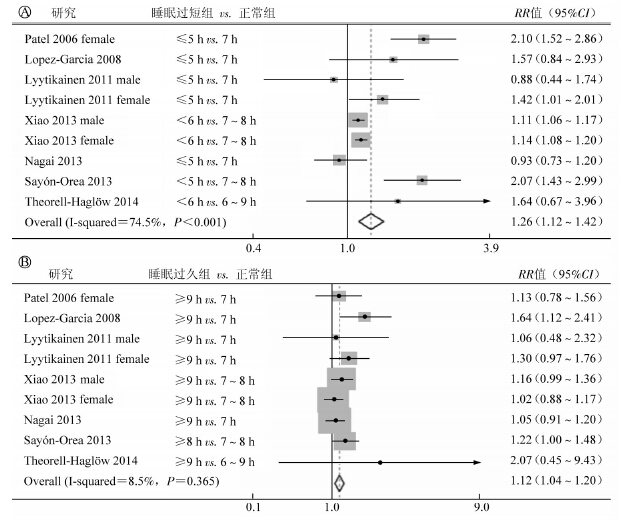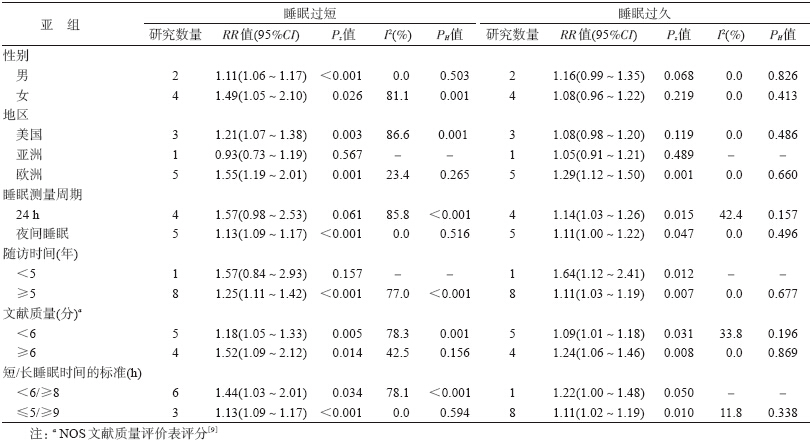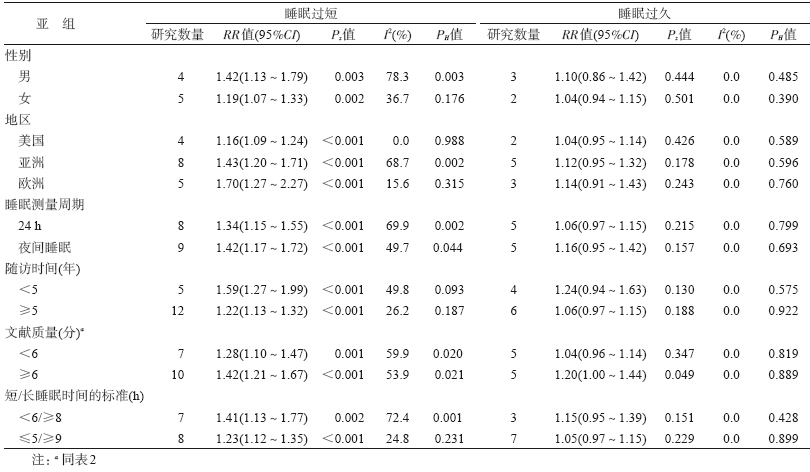文章信息
- 张爽, 李莲, 黄育北, 陈可欣. 2014.
- Zhang Shuang, Li Lian, Huang Yubei, Chen Kexin. 2014.
- 成年人睡眠时间对体重增加和肥胖风险的Meta分析
- Meta-analysis of prospective cohort studies about sleep duration and risk of weight gain and obesity in adults
- 中华流行病学杂志, 2015, 36(5): 519-525
- Chinese Journal of Epidemiology, 2015, 36(5): 519-525
- http://dx.doi.org/10.3760/cma.j.issn.0254-6450.2015.05.023
-
文章历史
- 投稿日期:2015-01-04
重和肥胖已经成为目前最严重的公共卫生问题之一,2008年全球>15岁人群中肥胖人数已超过5亿[1]。而我国成人肥胖率的增长态势同样严峻,从2002年的5.6%增长到2010年的12.0%,超重和肥胖人口总数已居世界第一位[2]。先前的研究曾报道肥胖和多种慢性疾病相关,诸如糖尿病、心血管疾病和癌症等[3, 4]。因此,肥胖可能会导致生活质量的降低并带来巨大的经济负担[5]。热量摄入和消耗的不均衡是体重增加以及肥胖发生的主要因素,但目前已有研究提示睡眠时间可能也是因素之一[6]。睡眠在激素分泌、代谢变化和生活习惯的改变等方面均发挥重要的作用,可能会导致体重的变化[6]。近年来已有大量关于睡眠时间和肥胖风险的流行病学研究[7],但其中的大多数文献都是基于横断面观察,故而并不能证明睡眠时间和肥胖发生的因果关系,即使是队列研究的结果也并不一致[8]。本研究通过相关领域前瞻性队列研究方法的文献进行Meta分析,综合评价睡眠时间对体重增加和肥胖风险的作用,以期为肥胖的预防和控制提供科学依据。 资料与方法
1. 文献检索:在PubMed、Embase和Cochrane Library以及万方、维普、CNKI进行相关检索,英文检索词为sleep和body mass index或BMI或obese或obesity或weight,中文检索词为睡眠和体重或肥胖或BMI,以上检索时间均限定为1980年1月至2014年10月,并对相关文献的参考文献进行手动搜索。
2. 原始文献纳入、排除标准和文献质量评价:纳入标准为①前瞻性队列研究;②研究对象为成年人(≥18岁);③以随访开始的基线睡眠时间为暴露因素;④以体重改变或肥胖发生为结局变量;⑤评价了睡眠时间对体重改变或肥胖风险的关联;⑥提供相对危险度(RR)及其95%置信区间(CI);⑦文献语种为英文或中文。排除标准为①重复发表或资料相似的文献;②横断面或病例对照研究;③报道信息不完整;④研究对象为儿童或青少年;⑤Newcastle- Ottawa Scale(NOS)评价文献质量≤4分的低质量研究。根据队列研究的特点,采用NOS文献质量评价表对原始文献进行评价[9],包括选择、可比性和结局等几个条目,满分为9分。 3
. 文献资料的数据提取:对于所纳入的文献,提取第一作者、发表年份、研究队列的国家、随访年限、研究对象的人口学特征(种族、年龄和性别)、样本量、睡眠时间分类(睡眠过短、睡眠过久和正常睡眠时间的标准)、睡眠时间的测量方式、体重改变和肥胖的标准、体重和肥胖的测量方式、调整的RR值和95%CI,所调整的变量。
4. 睡眠时间的测量方式和界值:对于睡眠时间的测量,所有的队列均采用自我报告的方式。睡眠过短和过久的界值均参照每篇文献自身的标准。在大部分研究中,正常睡眠时间为7~8 h或7 h(每晚或每天),而睡眠过短通常被定义为≤5 h或者<6 h,睡眠过久则被定义为≥8 h或≥9 h。
5. 体重改变、肥胖的测量方式和界值:有7篇文献采用标准测量的方式采集身高和体重的数据[10, 11, 12, 13, 14, 15, 16],有9篇文献采用了自我报告的方式[17, 18, 19, 20, 21, 22, 23, 24, 25]。对于体重改变,有4篇文献将增重5 kg以上作为结局变量[11, 19, 21, 23],而其他的几项研究则分别将增重3 kg[24],10 kg[25]或者15 kg[18]作为结局变量。对于肥胖的标准,在西方国家为BMI≥30 kg/m2,在亚洲则为BMI≥25 kg/m2或≥28 kg/m2。
6. 统计学分析:采用逆方差加权的方法计算合并的RR值及其95%CI,由Z检验决定其显著性。应用Q检验和I2统计量估算研究间的异质性,如果异质性不显著(PH>0.05且I2<50%),采用固定效应模型,反之则采用随机效应模型[26]。亚组分析包括性别、地区、睡眠测量周期、随访时间、睡眠过短或过久的界值以及文献质量等。在分析睡眠时间和体重增加的研究中,将体重改变5 kg以上作为结局变量,并对文献中的不同结局标准按照公式作了统一校正[27]。应用Egger检验估算发表偏倚[28],如果发表偏倚显著,采用剪补法修正效应值。同时还采用了敏感性分析以确证研究结果的稳定性[29]。所有的P值均为双侧检验,P<0.05则认为有统计学差异。统计软件均使用Stata 12.0软件。 结 果
1. 纳入文献基本情况:使用关键词共搜索到4 507篇文献,通过筛选题目和摘要后进一步确定了274篇文献,在详细阅读全文后,共有16篇文献符合纳入标准,样本总量为285 452。如果原始文献按照不同的性别报告结果,则将不同性别作为单独的队列分别进入研究。在睡眠时间和体重增加的风险研究中,共纳入9个队列;在睡眠时间和肥胖发生风险的研究中,共纳入17个队列。所纳入的相关文献的详细情况如表 1所示,分别有3篇来自于美国,6篇来自亚洲,7篇来自欧洲,随访时间从1年到16年不等。
2. 有关睡眠时间和体重增加风险的Meta分析:在睡眠过短的分析中,异质性显著存在(I2=74.5%,P<0.001),故采用随机效应模型,睡眠过短可以显著增加体重增长超过5 kg的风险(RR=1.26,95%CI:1.12~1.42,P<0.001)(图 1 )。在睡眠过久的分析中,异质性不显著(I2=8.5%,P=0.365),故采用固定效应模型,睡眠过久与体重增长5 kg以上的风险显著相关(RR=1.12,95%CI:1.04~1.20,P=0.002)(图
)。在睡眠过久的分析中,异质性不显著(I2=8.5%,P=0.365),故采用固定效应模型,睡眠过久与体重增长5 kg以上的风险显著相关(RR=1.12,95%CI:1.04~1.20,P=0.002)(图 ?)。在睡眠过短和过久中,发表偏倚均不显著,Egger检验P值分别为0.149和0.086。敏感性分析结果显示该结果较稳定。在亚组分析中,该关联在亚洲地区、24 h为睡眠的测量周期和随访时间<5年的亚组中不显著,而该关联在高质量的研究、以<6 h和≥8 h为界值的亚组中更强(表 2)。
?)。在睡眠过短和过久中,发表偏倚均不显著,Egger检验P值分别为0.149和0.086。敏感性分析结果显示该结果较稳定。在亚组分析中,该关联在亚洲地区、24 h为睡眠的测量周期和随访时间<5年的亚组中不显著,而该关联在高质量的研究、以<6 h和≥8 h为界值的亚组中更强(表 2)。
 |
注:  睡眠过短组和体重增加超过5 kg风险的关联(RR=1.26,95%CI:1.12~1.42,P<0.001); 睡眠过短组和体重增加超过5 kg风险的关联(RR=1.26,95%CI:1.12~1.42,P<0.001);  睡眠过久组和体重增加超过5 kg风险的关联(RR=1.12,95%CI:1.04~1.20,P=0.002)图 1 睡眠时间和体重增加超过5 kg风险的关联性分析森林图 睡眠过久组和体重增加超过5 kg风险的关联(RR=1.12,95%CI:1.04~1.20,P=0.002)图 1 睡眠时间和体重增加超过5 kg风险的关联性分析森林图 |
3. 有关睡眠时间和肥胖发生风险的Meta分析:在睡眠过短的分析中,异质性显著存在(I2=59.1%,
P=0.001),故采用随机效应模型,睡眠过短可以显著增加肥胖发生的风险(RR=1.35,95%CI:1.22~1.50,P<0.001)(图 2 )。在睡眠过久的分析中,异质性不显著(I2=0.0%,P=0.869),故采用固定效应模型,睡眠过久不会显著增加肥胖风险(RR=1.07,95%CI:0.99~1.16,P=0.092)(图 2
)。在睡眠过久的分析中,异质性不显著(I2=0.0%,P=0.869),故采用固定效应模型,睡眠过久不会显著增加肥胖风险(RR=1.07,95%CI:0.99~1.16,P=0.092)(图 2 )。睡眠过短的研究中,发表偏倚Egger检验P=0.032,采用剪补法校正后该RR值为1.28 (95%CI:1.15~1.43)。睡眠过久的研究发表偏倚不显著,Egger检验P=0.156。敏感性分析结果显示该结果较稳定。在亚组分析中,睡眠过短与肥胖的关联在男性、夜间睡眠为测量周期、随访时间<5年、高质量研究、以<6 h和≥8 h为界值的亚组中更强,且睡眠过久与肥胖的关联在高质量研究的亚组中有显著性(表 3)。
)。睡眠过短的研究中,发表偏倚Egger检验P=0.032,采用剪补法校正后该RR值为1.28 (95%CI:1.15~1.43)。睡眠过久的研究发表偏倚不显著,Egger检验P=0.156。敏感性分析结果显示该结果较稳定。在亚组分析中,睡眠过短与肥胖的关联在男性、夜间睡眠为测量周期、随访时间<5年、高质量研究、以<6 h和≥8 h为界值的亚组中更强,且睡眠过久与肥胖的关联在高质量研究的亚组中有显著性(表 3)。
 |
注: 睡眠过短组和肥胖发生的关联(RR=1.35,95%CI:1.22~1.50,P<0.001); 睡眠过短组和肥胖发生的关联(RR=1.35,95%CI:1.22~1.50,P<0.001);  睡眠过久组和肥胖发生的关联(RR=1.07;95%CI:0.99~1.16,P=0.092)图 2 图 2睡眠时间和肥胖发生风险的关联性分析森林图 睡眠过久组和肥胖发生的关联(RR=1.07;95%CI:0.99~1.16,P=0.092)图 2 图 2睡眠时间和肥胖发生风险的关联性分析森林图 |
本文表明睡眠过短可以显著增加体重以及增加肥胖的风险,睡眠过久也会导致体重的增加。在睡眠时间和增加体重5 kg以上的关联分析中,与正常睡眠相比,睡眠过短组的风险会高出26%,睡眠过久组的风险会高出12%。这与先前有关睡眠时间和体重增加关联呈“U”形关系的研究一致[30]。对于睡眠时间和发生肥胖的关联分析,睡眠过短组发生肥胖的风险高出35%,但睡眠过久与肥胖关联不具有显著性。在亚组分析中,研究质量、随访时间以及睡眠过短或过久的标准可能是影响该关联的因素。这提示在今后的研究中需要采用重复测量方法、统一的睡眠时间标准以及研究质量高的队列研究来进一步证明该关联。
国内外有许多研究表明,睡眠过短会对体重变化或肥胖风险产生影响。Cappuccio等[31]对2008年前发表的横断面和队列研究进行Meta分析,结果显示睡眠过短会显著肥胖的风险(RR=1.55,95%CI:1.43~1.68)。Yiengprugsawan等[32]进行的一项样本量为60 569的队列研究也显示,每晚睡眠少于6 h会导致体重的增加。而睡眠过久是体重增加或肥胖的危险因素[33]、保护因素[34]和无关因素[19, 23]的研究均有报道,结果颇具争议。Magee等[33]的研究显示,每晚睡眠长于9 h可增加肥胖风险(RR=1.22,95%CI:1.13~1.32)。而Donat等[34]的研究则表明每晚睡眠长于9 h可降低肥胖风险(RR=0.78,95%CI:0.67~0.89)。还有一些研究称睡眠过久与体重变化并无关联[19, 23]。本研究发现睡眠过久会显著导致体重的增加,但其与肥胖风险的关联不显著。而在高质量的文献结果中,睡眠过久与肥胖的关联仍具有显著性(RR=1.20,95%CI:1.00~1.44,P=0.049)。因此今后还需要更多的高质量研究进一步验证睡眠过久对体重变化和肥胖风险的关联。
有关睡眠和体重的机制尚不完全清楚。睡眠不足可能会增加能量的摄入。比如睡眠缺乏会导致血液中胃饥饿素水平的升高和瘦素水平的降低,通过刺激食欲增加主观饥饿感[6]。实验性研究也已发现睡眠剥夺会影响食物的选择,比如减少蔬菜水果的摄入,增加进食高能量食物[35]。睡眠不足的人还可能有更长时间用于久坐,并由此增加了进食的机会。同时,睡眠缺乏还会导致能量消耗减少,比如睡眠缺乏会导致白天的疲倦感,引起自主运动的减少。睡眠过短还会导致体温较低[36]。睡眠过久对体重变化的影响可能在于,因睡眠过多而导致体力活动的相对减少,降低了能量消耗。有研究表明睡眠过久可能还在于受访者对睡眠时间的过多估计,例如睡眠障碍者虽长时间卧床但并未真正入睡[25]。因此,今后需要活动记录仪或者睡眠多导图等客观测量方式来精确测定睡眠时间。
本研究的优势在于纳入的均为前瞻性队列研究,因果论证强度更高,且样本量较大,结果更为可靠。但也存在局限性:①所纳入的队列均来自于欧美和东亚,不能代表其他种族的人群。②尽管纳入的是经调整的RR值,但每篇文献所调整的变量并不一致。③本研究只分析了睡眠时间,没有考虑睡眠质量对体重变化和肥胖的影响。④部分研究结果存在显著异质性,而这些异质性在某些亚组分析中显著减少,提示亚组分析的因素可能为异质性的来源。⑤本文所有纳入的研究均采用自我报告测量睡眠时间。尽管自我报告不能精确估计睡眠总时间,但已有研究称自我报告与活动记录仪测量的睡眠时间具有高度相关性[37]。⑥所有的文献均采用BMI作为肥胖的判断标准,但BMI并不能提供精准的体脂肪水平,其准确性还受到年龄、健身水平的影响[37]。在今后的研究中,采用腰围、腰臀比、腰围身高比等测量指标会提供有关肥胖风险的更详细信息[38]。
综上所述,本文提示睡眠时间的缺少和过多都会增加体重,且睡眠过短会显著增加肥胖的风险。目前来讲,适宜的睡眠时间还未作为预防和控制肥胖的策略,因此医疗保健人员和健康教育者应对促进睡眠的干预措施引起足够重视。在公共卫生领域,我们鼓励适宜的睡眠时间以预防肥胖和与其相关的疾病。采用客观测量睡眠的大规模队列研究以及随机对照试验有助于验证病因,且从睡眠缺乏到体重变化的生理学机制也需要进一步的实验研究来证明。
| [1] Finucane MM, Stevens GA, Cowan MJ, et al. National, regional, and global trends in body-mass index since 1980:systematic analysis of health examination surveys and epidemiological studies with 960 country-years and 9.1 million participants[J]. Lancet, 2011, 377(9765):557-567. |
| [2] Chinese center for disease control and prevention. National center for chronic and noncommunicabledisease control and prevention, China. Report on chronic disease risk factor surveillance in China(2010)[R]. Beijing:Military Medical Science Press, 2012. (in Chinese) 中国疾病预防控制中心, 中国疾病预防控制中心慢性非传染性疾病预防控制中心. 中国慢性病及其危险因素监测报告(2010)[R]. 北京:军事医学科学出版社, 2012. |
| [3] Zhang HZ, Jin GF, Shen HB. Epidemiologic differences in esophageal cancer between Asian and Western populations[J]. Chin J Cancer, 2012, 31(6):281-286. |
| [4] Xie WX, Cao WH, Lin J. Study on the relationship between obesity and clustering of major risk factors on cardiovascular diseases in the elderly[J]. Chin J Epidemiol, 2008, 29(10):975-978. (in Chinese) 解武祥, 曹卫华, 林军. 老年肥胖与心血管病主要危险因素聚集的关系[J]. 中华流行病学杂志, 2008, 29(10):975-978. |
| [5] Zhao WH, Zhai Y, Hu JP, et al. Economic burden of obesity related chronic diseases in China[J]. Chin J Epidemiol, 2006, 27 (7):555-559. (in Chinese) 赵文华, 翟屹, 胡建平, 等. 中国超重和肥胖造成相关慢性疾病的经济负担研究[J]. 中华流行病学杂志, 2006, 27(7):555-559. |
| [6] Bayon V, Leger D, Gomez-Merino D, et al. Sleep debt and obesity[J]. Ann Med, 2014, 46(5):264-272. |
| [7] Patel SR, Hu FB. Short sleep duration and weight gain: a systematic review[J]. Obesity (Silver Spring), 2008, 16(3):643-653. |
| [8] Magee L, Hale L. Longitudinal associations between sleep duration and subsequent weight gain:a systematic review[J]. Sleep Med Rev, 2012, 16(3):231-241. |
| [9] Wells G, Shea BDOC. The Newcastle-Ottawa Scale (NOS) for assessing the quality of nonrandomised studies in meta-analyses[J]. Ottawa (ON):Ottawa Hospital Research Institute, 2009. http://www.ohri.ca/programs/clinical_epidemiology/oxford.htm. BMC Public Health, 2014, 14:290. |
| [10] Stranges S, Cappuccio FP, Kandala NB, et al. Cross-sectional versus prospective associations of sleep duration with changes in relative weight and body fat distribution:the Whitehall Ⅱ Study[J]. Am J Epidemiol, 2008, 167(3):321-329. |
| [11] Lopez-Garcia E, Faubel R, Leon-Munoz L, et al. Sleep duration, general and abdominal obesity, and weight change among the older adult population of Spain[Z]. Am J Clin Nutr, 2008, 87:310-316. |
| [12] Watanabe M, Kikuchi H, Tanaka K, et al. Association of short sleep duration with weight gain and obesity at 1-year follow-up:a large-scale prospective study[J]. Sleep, 2010, 33(2):161-167. |
| [13] Nishiura C, Noguchi J, Hashimoto H. Dietary patterns only partially explain the effect of short sleep duration on the incidence of obesity[J]. Sleep, 2010, 33(6):753-757. |
| [14] Itani O, Kaneita Y, Murata A, et al. Association of onset of obesity with sleep duration and shift work among Japanese adults[J]. Sleep Med, 2011, 12(4):341-345. |
| [15] Kobayashi D, Takahashi O, Deshpande GA, et al. Association between weight gain, obesity, and sleep duration:a large-scale 3-year cohort study[J]. Sleep Breath, 2012, 16(3):829-833. |
| [16] Gutiérrez-Repiso C, Soriguer F, Rubio-Martín E, et al. Night- time sleep duration and the incidence of obesity and type 2 diabetes. Findings from the prospective Pizarrastudy[J]. Sleep Med, 2014, 15(11):1398-1404. |
| [17] Hasler G, Buysse DJ, Klaghofer R, et al. The association between short sleep duration and obesity in young adults:a 13-year prospective study[J]. Sleep, 2004, 27(4):661-666. |
| [18] Patel SR, Malhotra A, White DP, et al. Association between reduced sleep and weight gain in women[J]. Am J Epidemiol, 2006, 164(10):947-954. |
| [19] Lyytikainen P, Rahkonen O, Lahelma E, et al. Association of sleep duration with weight and weight gain:a prospective follow- up study[J]. J Sleep Res, 2011, 20(2):298-302. |
| [20] Hong X, Li JQ, Liang YQ, et al. The Relationship between Sleeping Duration and Obesity:a Three-Year Follow-up Study in Nanjing[J]. Chin J Prev Contr Chron Dis, 2011, 19(3):226- 229. (in Chinese) 洪忻, 李解权, 梁亚琼, 等. 睡眠时间与肥胖关系的3年随访研究[J]. 中国慢性病预防与控制, 2011, 19(3):226-229. |
| [21] Nagai M, Tomata Y, Watanabe T, et al. Association between sleep duration, weight gain, and obesity for long period[J]. Sleep Med, 2013, 14(2):206-210. |
| [22] Vgontzas AN, Fernandez-Mendoza J, Miksiewicz T, et al. Unveiling the longitudinal association between short sleep duration and the incidence of obesity:the Penn State Cohort[J]. Int J Obes (Lond), 2014, 38(6):825-832. |
| [23] Xiao Q, Arem H, Moore SC, et al. A large prospective investigation of sleep duration, weight change, and obesity in the NIH-AARP Diet and Health Study cohort[J]. Am J Epidemiol, 2013, 178(11):1600-1610. |
| [24] Sayón-Orea C, Bes-Rastrollo M, Carlos S, et al. Association between Sleeping Hours and Siesta and the Risk of Obesity:The SUN Mediterranean Cohort[J]. Obesity Facts, 2013, 6(4):337-347. |
| [25] Theorell-Hagläw J, Berglund L, Berne C, et al. Both habitual short sleepers and long sleepers are at greater risk of obesity:a population-based 10-year follow-up in women[J]. Sleep Med, 2014, 15(10):1204-1211. |
| [26] Higgins JP, Thompson SG, Deeks JJ, et al. Measuring inconsistency in meta-analyses[J]. BMJ, 2003, 327(7414):557-560. |
| [27] Shah AS, Langrish JP, Nair H, et al. Global association of air pollution and heart failure:a systematic review and meta-analysis[J]. Lancet, 2013, 382(9897):1039-1048. |
| [28] Egger M, Davey SG, Schneider M, et al. Bias in meta-analysis detected by a simple, graphical test[J]. BMJ, 1997, 315(7109):629-634. |
| [29] Patsopoulos NA, Evangelou E, Ioannidis JP. Sensitivity of between- study heterogeneity in meta-analysis:proposed metrics and empirical evaluation[J]. Int J Epidemiol, 2008, 37(5):1148-1157. |
| [30] Chaput JP, Despres JP, Bouchard C, et al. The association between sleep duration and weight gain in adults:a 6-year prospective study from the Quebec Family Study[J]. Sleep, 2008, 31(4):517-523. |
| [31] Cappuccio FP, Taggart FM, Kandala NB, et al. Meta-analysis of short sleep duration and obesity in children and adults[J]. Sleep, 2008, 31(5):619-626. |
| [32] Yiengprugsawan V, Banwell C, Seubsman SA, et al. Short sleep and obesity in a large national cohort of Thai adults[J]. BMJ Open, 2012, 2(1):e561. |
| [33] Magee CA, Caputi P, Iverson DC. Is sleep duration associated with obesity in older Australian adults?[J]. J Aging Health, 2010, 22(8):1235-1255. |
| [34] Donat M, Brown C, Williams N, et al. Linking sleep duration and obesity among black and white US adults[J]. Clin Pract (Lond), 2013, 10(5):661-667. |
| [35] Kjeldsen JS, Hjorth MF, Andersen R, et al. Short sleep duration and large variability in sleep duration are independently associated with dietary risk factors for obesity in Danish school children[J]. Int J Obes (Lond), 2014, 38(1):32-39. |
| [36] Micic G, de Bruyn A, Lovato N, et al. The endogenous circadian temperature period length (tau) in delayed sleep phase disorder compared to good sleepers[J]. J Sleep Res, 2013, 22(6):617- 624. |
| [37] Magee CA, Iverson DC, Huang XF, et al. A link between chronic sleep restriction and obesity:methodological considerations[J]. Public Health, 2008, 122(12):1373-1381. |
| [38] Chen CM. Waist circumference is an important tool for disease risk Prediction[J]. Chin J Epidemiol, 2010, 31(6):601-602. (in Chinese) 陈春明. 腰围指标是重要的疾病风险预测工具[J]. 中华流行病学杂志, 2010, 31(6):601-602. |
 2015, Vol. 36
2015, Vol. 36





